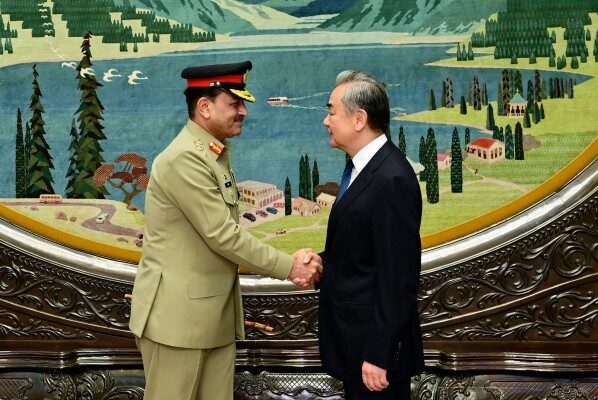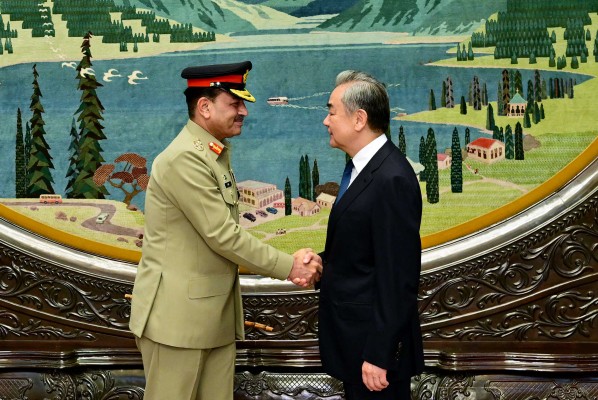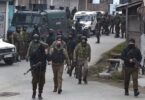In a desperate attempt to mollify the dragon, the Pakistan COAS scrambled to Beijing, while foregoing his scheduled visits to Sri Lanka and Indonesia.
The recently promoted Field Marshal Asim Munir’s sudden change in the travel itinerary has raised several questions. Pakistan’s act of desperation to prioritise Beijing over Sri Lanka and Indonesia, presents a question if its relation with its “iron clad brother” is on a brink of waning while both nations have kept up appearances.
On 24 July 2025, Munir met with Wang Yi, Member of the Political Bureau of the CPC Central Committee and Director of the Office of the Central Commission for Foreign Affairs and other top Chinese leaders, including Vice President Han Zheng and top military official General Zhang Youxia, on July 25, 2025. The meeting in Beijing has been extremely crucial for Pakistan who has been consistently pressured by the Chinese on matters of safety of Chinese nationals, projects, and institutions. Beijing sent a clear indication that Pakistan’s internal instability and terror attacks stemming from its political mess is a threat to the Chinese strategic interests. This also indicates the possibility to China suspending its investments and activities in Pakistan which would be of a consequence to Pakistan. Furthermore, Munir’s rushed departure to Beijing by sidelining the official visit to Sri Lanka and Indonesia is indicative of Pakistan’s heavy reliance on Chinese economic support and diplomatic backing. It is also evident that Pakistan will have to play the jester to both China and the US if it intends to maintain its strategic relevance.

Since Operation Sindoor, Pakistan’s renewed efforts in Washington have been to reclaim some relevance compared to India’s rising stature.
In the past months, Pakistan has tried to convince US for maintaining alliance with Islamabad despite of gaining close proximity to Beijing.
Having dined with President Donald Trump, he had managed to secure the label of a “great man” from Trump along with his new found medals. Simultaneously, Pakistan’s finance minister Aurangzeb visited Washington to engage with US officials, followed by Pakistan’s Foreign Minister Ishaq Dar recent meeting with Secretary of State Marco Rubio. It is expected that the juggler would be expected to prove his allegiance to the dragon or the US given his overreaching aspirations to tug them both on board with his plans. Hence, Munir rushing to Beijing is presumably expected due to his intention to prove Pakistan’s loyalty to China despite the renewed relations with US.
This was Munir’s first visit to China since Operation Sindhoor. Expectedly, China’s reason to be miffed comes as no surprise, given the persistent terror attacks on its citizens in Pakistan. It is evident that Pakistan has failed to deliver what it promised despite its repeated assurances to China and its security apparatus to safeguard the Chinese nationals working on CPEC projects from the insurgent/terror attacks.
In the past Beijing had proposed to deploy its own security to Pakistan to protect the Chinese nationals.
A written proposal was dispatched to Islamabad by Beijing for Pakistani security agencies to review. It outlined the deployment of security agencies and military forces into each others’ territory to assist in counter-terrorism operations and conduct joint strikes.
On 20 Nov 2024, China and Pakistan commenced first joint counterterrorism military exercise “Warrior-VIII exercise”, which would extend until mid-December. The exercise aimed at enhancing counterterrorism capabilities and military diplomacy between the two nations. The drills included the troops from the Western Theatre Command of China’s People’s Liberation Army with focus on a multi-tiered training in accordance with the actual combat process.
On the day of the commencement of the joint exercise a civilian convoy consisting of 200 vehicles enroute to Peshawar from Parachinar came under a heavy gunfire attack in Khyber Pakhtunkhwa (KP) province in Kurram district. The area is known for its history of sectarian disharmony between Sunni and Shiite communities and is also the area of operations of the Tehreek-e-Taliban Pakistan (TTP). Over 39 people were killed on 20 Nov 2024 in the attack.
In October 2024, Baloch Liberation Army (BLA) claimed responsibility for a late-night bombing which targeted a convoy with Chinese nationals outside the Karachi airport, killing two workers from China and wounding eight individuals including officials and the insurgent group. In November 2024, Karachi Airport and its surrounding vicinity were declared a red zone area due to security concerns. Entry routes around the airport were restricted.
The uptick in insurgency/militant activities is obviously owed to the presence of the Chinese in Pakistan, who are perceived as colonisers by many insurgent and militant outfits that seek an independent state separate from Pakistan.
The apprehension of being marginalized or subjugated by Pakistan government to curry favours from Beijing for the political-economic reasons has been a primary factor for the brewing hate amongst the insurgent/militant groups in Balochistan, Sindh, Khyber Pakhtunkhwa and Pakistan-occupied Kashmir and Gilgit-Baltistan.
The arbitrary raids, crackdowns, violation of human rights, introduction of stricter blasphemy laws, extrajudicial killings and displacement of many Baloch, Sindhis, Pashtuns and local inhabitants by the of Pakistan military has aggravated the situation further. Apart from the eruption of newer terrorist/separatist splinter groups, the country has been experiencing series of mass protests from its citizens. (https://www.thestrategicperspective.org/articles/has-pakistan-completely-lost-its-writ-in-khyber-pakhtunkhwa/ )
Additionally with Taliban in power in Afghanistan, groups like Tehreek–e-Taliban Pakistan (TTP) and Hafiz Gulbahadur group have managed to foster strong alliances with anti-Pakistan networks in Afghanistan. ( https://www.thestrategicperspective.org/articles/hgb-fidayeen-attack-kills-16-soldiers-in-khyber-pakhtunkhwa/ )
With limited cooperation from Taliban, Pakistan faces both number of internal and external threats, which target its military, establishments along with Chinese investments and citizens.
The China-Pakistan Economic Corridor (CPEC), the flagship of the Belt and Road Initiative with over $65 billion USD invested in it, has been a perpetual target of terror attacks.
The government of Pakistan is consistently faced with the dilemma of having to incur high costs for launching a large-scale military operation to appease China or utilize some of its own nurtured terror outfits to act on its behest against the one’s who threaten its establishment. The latter option has been viable as it helps in cost cutting in comparison to running an expensive operation while simultaneously providing the government with the deniability for any human rights violations or questionable actions taken in regards. Additionally, Pakistan’s poor economic conditions have only enslaved it to China and US, because of which it is forced to juggle between its loyalties for the US and China.
After the launch of the CPEC projects, a militarily trained unit of over 13,000 troops has been deployed to safeguard the initiatives nationwide. However, despite the efforts, the attacks on Chinese nationals have persisted.
Pakistan has always been careful to not disappoint the Chinese brother. This was evident in regard to the Lal Masjid operation in 2007. The operation was a result of direct Chinese pressure on then President General Pervez Musharraf, who was expected to carry a punitive action against the Islamic fundamentalists responsible for the abductions and killings of Chinese citizens. Post the operation Lal Masjid, heavy backlash followed against the Musharraf government. It was criticized for pandering to Chinese concerns and hurting the religious sentiments of Muslims by ordering a siege at the Lal masjid. At the time, a taped message of Ayman al-Zawahiri, Osama bin Laden’s No.2 in Al Qaeda, was being broadcasted at various places in Pakistan, calling for jihad against the Army raid into the Lal Masjid. Since then, anti China sentiments have continued to brew amongst the people.
In November 2018, the BLA orchestrated an attack on the Chinese consulate in Karachi, killing four people. This followed by another attack on a luxury hotel in Gwadar, often used by Chinese nationals working at the port. By June 2020, the BLA claimed responsibility for the attack on the Pakistan Stock Exchange, where Chinese companies own 40% of the stakes.
On 21st April 2021, Tehrik-i-Taliban (TTP) claimed an attack at hotel Serena in Quetta. The same year, a convoy of Chinese workers in Khyber Pakhtunkhwa was attacked, killing 9 Chinese nationals. This was believed to be the work of TTP.
On 20th August 2021, BLA targeted a vehicle carrying Chinese nationals in Gwadar, Balochistan.
By 2022, BLA claimed another fidayeen attack. Three Chinese instructors at the Confucius Institute of the University of Karachi and their Pakistani driver were killed.
On 6 September 2023, TTP launched a large-scale operation in Chitral district in KP on the occasion of Pakistan’s National Defence Day. Heavy artillery and exchange of gunfire commenced between the Pakistan military and TTP fighters.
On 26 March 2024, five Chinese workers and their local driver were killed in a BLA fidayeen attack, when an IED laden vehicle rammed into the workers’ convoy enroute to the Dasu dam in KP.
Later on 7 October 2024, two Chinese nationals died in a suicide attack near Karachi’s Jinnah International Airport. The BLA claimed responsibility. Prior to the bombing, two Chinese nationals were shot by a Pakistani guard in Karachi on 5th November 2024. Even though the authorities dismissed the incident as a personal scuffle, the fact that the safety of Chinese citizens remains much in question.
Dragon’s Reaction
The Chinese Ambassador to Pakistan Mr. Jiang Zaidong in 2024, at a seminar titled “China at 75”, expressed Beijing’s frustration in regards to the terror attacks on the Chinese and Pakistan’s inability at safeguarding the Chinese assets or its citizens. He conveyed China’s reluctance to deploy its citizens in areas of threat while mentioning the special exception his country made in regards to Pakistan. However, Pakistan has managed to see-saw its relations with the Chinese to keep up appearance of its amicable ties with Beijing.
Due to the ongoing developments, in terms of the political and financial uncertainty In Pakistan, it is probable for China to temporarily hold off on making newer investments in the CPEC.
In 2024 China pressured Pakistan to announce a large scale comprehensive military operation ‘Operation Azm-i-Istehkam’ and later demanded that the Prime Minister Shehbaz Sharif personally supervise the investigation into terrorist attacks on the Chinese nationals in Karachi ( https://www.thestrategicperspective.org/articles/visual-composer-1439/ ).
Despite it all, the Pakistani government guarantees to bolster the security failed to ameliorate the Sino worries. Post the attack in March 2024, the Power Construction Corporation of China (PCCC) which oversees the operations of Tarbela 5th extension Hydropower project also suspended its activities and laid off over 2000 employees due to security concerns. The completion of Tarbela 5th extension project was expected to be completed by 2026, with the support of the world bank.
Beijing has consistently pushed Islamabad to implement the Global Security Initiative. Under this initiative both nations have complied to carry joint police and paramilitary exercises in Gilgit-Baltistan and Xinjiang region.
Additionally, the threats posing from the Uyghur separatist groups, such as the East Turkestan Islamic Movement (ETIM) or the Huis, which are been reported to have safe havens in Gilgit-Baltistan may be curbed through these operations. It can be anticipated that Chinese security personnel may be placed in Khyber Pakhtunkhwa and Balochistan regions, where Chinese investments and personnel are frequently targeted by the Baloch insurgent groups. Previously Pakistan had limited the number of Chinese private security companies (PSCs), while giving first priority to local recruitment. However, the recent incidents may pave for more relaxed restrictions in regards to the number of Chinese PSC’s placed on the ground.
China’s proposed security mechanism focuses on the Chinese personnel managing the inner security grid, while the Pakistani forces would oversee the outer grid of security.
Reports of Beijing requesting Islamabad to permit it to establish a military base at Gwadar Port have surfaced. However, these speculations were denied by Pakistan.
Furthermore, the recent increment in Pakistan’s military budget to $162 million suggests the boosting of its security measures. This is the second largest defence grant in 2024 after the already sanctioned $218 million for Operation Azm-e-Istehkam. These addendums come supplementary to the already aggrandized defence budget of $7.64 billion which Pakistan has allocated to itself with an increase of 14.5% from 2023.
It can be assumed that through these efforts, Pakistan hopes to fortify its relation with China. 82% of Pakistan’s arms imports come from China and with its direct security intervention in Pakistan along with a military base at Gwadar, the Chinese aspirations for counterbalancing the US-India alliance may be possible.
China currently has a naval fleet strength of 370 warships, which is expected to grow to 435 by 2030, along with advanced Type 096 nuclear submarines. Gwadar Port would be forefront for its ambitions. The natural deep-water provision with the access to the shortest commercial trade routes due to its strategic position is the primary reason for Beijing’s interest in Gwadar.
With an expectation of $1.6 billion expansion planned since 2015 in regards to the Gwadar port, Pakistan has failed to materialize its plan due to the terror threats from the local insurgents. It can be anticipated that Pakistan will have to do a lot more than making tall tales and assurances if it hopes to appease the fire breathing dragon down its neck.





![Pakistan and Saudi Arabia signed a defence agreement on September 17 in Riyadh [Handout/Pakistan Prime Minister's Office]](https://www.thestrategicperspective.org/wp-content/uploads/2026/01/pak-saudi-145x100.jpg)





Well researched till 2024. We need to see how these events are impacting whatever is expected to happen now, is Aug 2025. Pak army is still inducting terrorists & weapons. There are also reports about Pak army falling short on supplies. Looking forward to an update 👍